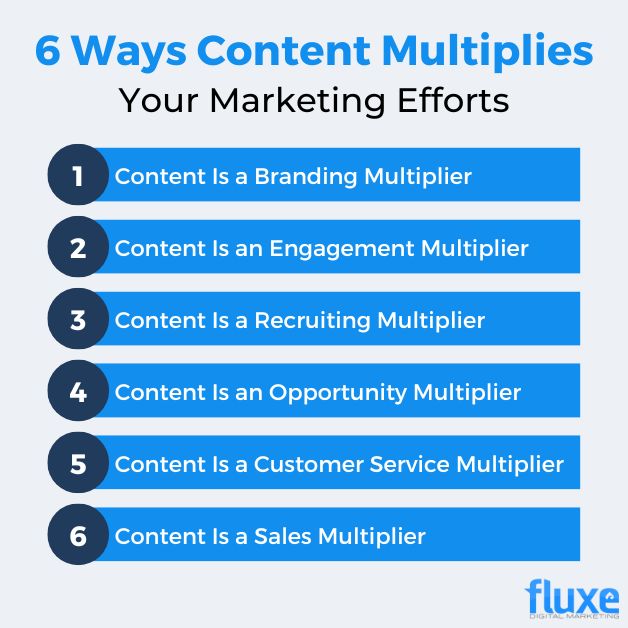What did you major in?
If you’re like many degree-earners, you went to school to learn a very specific skill set. Then, as a business owner, you leveraged that skill set by serving clients one-on-one.
You started with just a few clients, serving each individually. Now that you’ve added more, your attention, energy, and efforts move between them — but still one at a time.
That would be fine if you only had to worry about client success. But as a business owner, you also have to build awareness, attract new clients, make sales, develop strategies for client retention… the list goes on.
Amidst your loaded schedule, it can be easy to forget the reason you started your business in the first place: to help people. How do you carve more time out of your day to do that?
Here’s a secret: you don’t.
There’s an easy way to move beyond the one-on-one model and make a bigger impact through your business with all the time you don’t have. The key? Compound marketing.
What Is Compound Marketing?
Here’s a story you may have heard before: When asked what he thought mankind’s greatest invention was, Albert Einstein replied, “Compound interest… He who understands it earns it; he who doesn’t pays it.”
While this story about Einstein may be a myth — there’s no known evidence he said anything about compound interest — the value of compound interest is undeniable.
This same compounding principle applies to more than money.
Meet compound marketing. It’s a term we use to describe multiplying your expertise and experience into numerous strategic types of content assets that can be used along the client journey. These content assets include:
- Long-form written content (ebooks, blog posts, white papers)
- Video and audio content (podcasts, YouTube videos, TikToks)
- Graphics/data visualization
And so much more.
Essentially, compound marketing means making the move from educating your clients one-on-one to one-on-many while providing as much or more value.
Why Is Compound Marketing Important?
Why is compound marketing crucial to the expansion of your business?
If your only mechanism to communicate the knowledge you’ve worked so hard to acquire is one-on-one client encounters, you’ll always be limited by your physical location. It’s doing addition when you need to be doing multiplication.

If you truly want to have an impact on your audience, beyond money, compound marketing is the only scalable way to do it. Instead of using your expertise one-on-one, you reach many people simultaneously — and not just your existing clients.
When I talk to my clients — all future-focused business owners just like you — I often hear that prospects come to them quoting their blog posts and videos. Those business owners may not even remember exactly what they wrote or said, but that’s not what matters.
What matters is that it’s much easier to turn prospects into clients when they already understand your value.
A friend of mine once said, “Good content marketing is like the pitching wedge that chips the ball onto the green so sales can putt it in.” If you’re not into golf, that just means content marketing educates prospects about what your business can do for them, positioning you to make a sale as easily as sinking a putt.
As good as that sounds, you might be thinking, “I barely have time to brush my teeth in the morning! How am I supposed to find time to write blog posts and record podcasts?”
Here’s another secret: Creating valuable content doesn’t mean doing anything new.
If you think about it, you’re already answering questions all day, often recycling the same answers you’ve already given clients, staff, and colleagues in a way that compounds your efforts. Content marketing is just capturing what you already know and using it along the client journey in multiple ways.
What ways, you ask? Here are six.
Six Ways Content Multiplies Your Marketing Efforts
1. Content Is a Branding Multiplier
The first thing that usually comes to mind related to content marketing is creating and sharing valuable content people want to read, watch, and listen to. This is an important part of the process, but it’s only half the story.
Remember the old conundrum, “If a tree falls in the forest, does it make a sound?” Maybe so, but only to those two hikers who happen to be walking by.
If you have a great brand but nobody knows about it, does it make a sound? Maybe out in the boonies, but not where most prospects can hear it. You need to amplify your sound.
The real power of content marketing is that it can help you build your brand and position you as an industry leader. When you’re actually helpful to people regardless of their ability to pay you, you immediately get positioned as an authority, an advocate, and a premium service.
When done well, your content serves as an incredible resource for the market and makes you a massive attention-grabber for future and prospective clients.
They can hear you now.
2. Content Is an Engagement Multiplier
Good, quality content creates touchpoints beyond what you’re able to do physically — remember, a one-on-one client model is limited by your location.
Content is an incredible resource for your current clients who need more information about a topic they’re struggling with, which in turn engages them further with your business.
Not only that, but good content is a tool for your clients to share evangelistically, turning them into ambassadors for your brand. Take emailed newsletters, which can be forwarded, or YouTube videos, which can be shared, all at the click of a button. That ripple effect is invaluable — especially since it’s being done while you sleep!
3. Content Is a Recruiting Multiplier
What’s more powerful? A line about how great your company culture is with sweet stock photos of people in suits high-fiving, or a long train of content conveying your values and culture along with candid images of your team?
Most job-seekers will answer the latter. In the midst of The Great Resignation, today’s job-seekers aren’t necessarily being swayed by giant salaries. What’s most important to them is how a work environment fits into their life and aligns with their values.
It may sound like a stretch, but many of my clients have been able to dodge the brunt of The Great Resignation because of their high-quality content output. Quite a few of their newest employees started out as followers of their podcasts or blogs, and before they even applied for the job, they already understood and identified with the company’s approach and values.
Effective content marketing can help you kiss months-long job listings goodbye.
4. Content Is an Opportunity Multiplier
Content publication today isn’t the same as it was 20 years ago. In the past, you’d have to go through the hard work of writing a piece, finding an editor, and submitting to a handful of industry-specific magazines that charged readers a subscription fee — and based on the heavy volume of submissions, your piece would be rejected more likely than not.
Thank goodness we live in the 21st century. Today, you have access to countless free platforms that distribute your content free of charge to the entire world, multiplying your networking opportunities.
Good, value-based content distributed free of charge is an incredible attention grabber for other like-minded professionals who will identify quickly that you’re a market leader and a thought leader. Your future opportunities for collaboration and partnerships will be limitless.
I’ve seen this firsthand with my own clients. One — a medical practice owner — has started getting requests for quotes from major medical industry publications because existing writers frequently reference his content.
Content was key in helping two of my other clients sell their businesses for higher multiples — we grew one site from 2,000 monthly visitors to over 130,000, making it an invaluable asset for acquisition.
The more people you can help, the more opportunities you’ll attract — and the more you can bring to the table.
5. Content Is a Customer Service Multiplier
You know what’s more difficult than being a business owner? Being a business owner’s front office person.
What do administrators have to do the most? Repeat themselves. If you’re asked a question more than twice, it’s going to be asked again and again. And, unfortunately, your clients may not take the word of your front office staff. The last thing you want is for your front office staff to have to refer a frustrated client to you, only for you to tell that client the exact same thing.
To train your clients to become better clients, you can craft your content with those oft-repeated questions in mind. That way you have a library of answers for your front office staff to refer to. And since it’s all straight from the owner’s mouth, clients won’t argue with that!
6. Content Is a Sales Multiplier
…even if you aren’t a salesman.
In fact, a great piece of content is an anti-sales pitch. You’re not selling anything. You’re simply offering a service that’s useful for a subset of the population, and that service happens to have a fee associated with it. This kind of content creates new opportunities for lead generation, partnerships, and more.
Good content helps you go from selling to order-taking.
If you’re already getting more business than you can handle from referrals, good content will be an even greater multiplier. It proves you’ve already found your voice and should’ve been doing this all along.
Compound Marketing: Final Thoughts
The buyer experience doesn’t end with the initial transaction. You’re taking your buyers with you on a journey as you grow your business.
That journey is nothing more than a series of questions that must be answered, and answering those questions through great content has far-reaching benefits for your present and future clients and staff.
If you wait until you know everything, you’ll lose the connection with your audience. They want to go on the journey with you, so stop worrying about being perfect and start including them in your journey as you grow. That’s the difference between talking with them versus talking at them.
Wondering how compound marketing can help your business? Don’t hesitate to reach out. I’d be happy to help.



